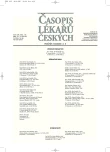Bioequivalence Studies of Pharmaceutical Preparations
Bioekvivalenční studie léčivých přípravků v České republice
Bioekvivalenční studie jsou ve farmaceutickém průmyslu velmi důležitou částí vývoje léčivého přípravku. Jejich podstatou je sledování farmakokinetických a farmakodynamických parametrů po podání testovaných přípravků (farmaceutických ekvivalentů nebo farmaceutických alternativ) s cílem hodnocení jejich terapeutické zaměnitelnosti. Význam bioekvivalenčních studií roste i vzhledem k velkému nárůstu výroby a spotřeby generických preparátů, které v současnosti v mnoha evropských zemích a v USA tvoří přibližně 50 % celkové preskripce. Výsledky bioekvivalenčních studií jsou spolu s údaji o farmaceutické kvalitě léčivého přípravku jednou z hlavních součástí registrační dokumentace předkládané výrobci generik národním regulačním autoritám. Registrace generických přípravků totiž nevyžaduje na rozdíl od přípravků originálních náročné a nákladné klinické zkoušení. Porovnání originálního přípravku a přípravku generického pomocí bioekvivalenčních studií je považováno za dostatečné. Cílem článku je poskytnout lékařské veřejnosti přehled o typech bioekvivalenčních studií, rozsahu a pravidlech pro jejich provádění, a umožnit tak získat svůj vlastní názor na terapeutickou zaměnitelnost léčivých přípravků.
Klíčová slova:
bioekvivalence, bioekvivalenční studie, farmakokinetické studie.
Authors:
D. Vetchý 1; K. Frýbortová 2; M. Rabišková 1; H. Daněčková 3
Authors‘ workplace:
Ústav technologie léků, Farmaceutická fakulta, Veterinární a farmaceutická univerzita, Brno
1; PLIVA – Lachema a. s., Brno
2; Státní ústav pro kontrolu léčiv, Praha
3
Published in:
Čas. Lék. čes. 2007; 146: 431-433
Category:
Review Article
Overview
Bioequivalence studies are very important for the development of a pharmaceutical preparation in the pharmaceutical industry. Their rationale is the monitoring of pharmacokinetic and pharmacodynamic parameters after the administration of tested drugs. The target of such study is to evaluate the therapeutic compatibility of tested drugs (pharmaceutical equivalents or pharmaceutical alternatives). The importance of bioequivalence studies is increasing also due to the large growth of the production and consumption of generic products. Generic products represent approximately 50 % of the whole consumption in many European countries and USA. The search output of bioequivalence study is together with the pharmaceutical quality data of medical product one of the main part of the registration file submitted to a national regulatory authorities. The registration of generic products does not demand complicated and expensive clinical study contrary to original product. The comparison of the original and the generic product via bioequivalence study is suggested as sufficient. The aim of this article is to provide to a medical public a summary about the types of bioequivalence studies, their range, rules of their practise and let them gain their own attitude to this question.
Key words:
bioequivalence, bioequivalence studies, pharmacokinetic studies.
Labels
Addictology Allergology and clinical immunology Angiology Audiology Clinical biochemistry Dermatology & STDs Paediatric gastroenterology Paediatric surgery Paediatric cardiology Paediatric neurology Paediatric ENT Paediatric psychiatry Paediatric rheumatology Diabetology Pharmacy Vascular surgery Pain management Dental HygienistArticle was published in
Journal of Czech Physicians

- Advances in the Treatment of Myasthenia Gravis on the Horizon
- Possibilities of Using Metamizole in the Treatment of Acute Primary Headaches
- Metamizole vs. Tramadol in Postoperative Analgesia
- Spasmolytic Effect of Metamizole
- Metamizole at a Glance and in Practice – Effective Non-Opioid Analgesic for All Ages
-
All articles in this issue
- Bioequivalence Studies of Pharmaceutical Preparations
- Cognitive Functions Impairment in Diabetes Mellitus Patient
- Stem Cells, Stem Cell Therapy, and Ethical Problems of Medicine
- Present View on the Spinal Haemangioma
- Phototoxic Reaction After the Systemic Administration of Antimicrobial Drugs
- Problems of Regulation of Breathing
- Conjugated Linoleic Acid – The Dietary Supplement in the Prevention of Cardiovascular Diseases
- Transcription Factor Egr-1 in Cardiovascular Biology
- Incidence, Diagnostics and Therapy of the Lung Cancer in the Czech Republic in 2003
- Study of the Eosinophilic Inflammation Activity in Bronchial Asthma
- Composition of the Nonesterified Fatty Acids and Lipid Peroxidation in Metabolic Syndrome
- Prospects of Body Composition Analysis by Bioimpedance Method in Children
- The Assessment of Body Composition in Patients with Thyroid Dysfunction
- Is Prescription of Physical Activity a Part of Health Care in Civilization Disorders? Results of Questionnaire Study in Medical Doctors
- Stress Cardiomyopathy
- Journal of Czech Physicians
- Journal archive
- Current issue
- About the journal
Most read in this issue
- Bioequivalence Studies of Pharmaceutical Preparations
- Study of the Eosinophilic Inflammation Activity in Bronchial Asthma
- Stress Cardiomyopathy
- Is Prescription of Physical Activity a Part of Health Care in Civilization Disorders? Results of Questionnaire Study in Medical Doctors
